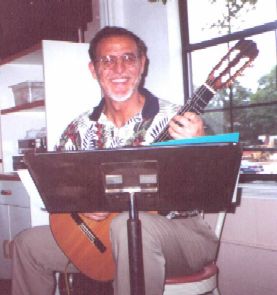I started playing guitar in the mid sixties in San Salvador, El Salvador. My father, who was born and raised in Puerto Rico, was in the U. S. Army and my family spent two years in San Salvador. I had no inclination to take up music or the guitar. My sister wanted to learn to play the guitar but what she had in mind was to learn to strum chords so she could sing Beatles songs. My father dutifully went in search of a guitar teacher. In the mid sixties, when people in San Salvador thought of someone learning to play the guitar, they didn't picture rebellious teenagers singing songs of protest. Instead, they pictured well-groomed, well-behaved and industrious youngsters playing beautiful and intricate instrumental pieces by Francisco Tarrega, Fernando Sor or Matteo Carcassi.

I will never forget our first guitar teacher. He was a small man with a meticulously groomed mustache. He always wore a coat and tie for our lessons and he carried inside his coat pockets an arsenal of short rulers, erasers, pens, pencils and colored pencils. He was very kind, pleasant and courteous. I still have the three notebooks that he wrote our lessons in. When the lesson was over he would visit with my parents in the living room. My mother would fix him some coffee and every now and then he would take a guitar and play unbelievably beautiful music. He decided to teach my sister and me using tablature instead of musical notation. I believe the reason he did so was because he felt we could progress to the point of playing pleasant-sounding solos more quickly. A year or so after starting guitar lessons I started to learn to read music but on the trumpet in high school band. One day when I was looking for trumpet music at the music store down the street from our house in Dothan, Alabama, my eyes fell upon a method book for classical guitar. I bought it and began to learn where all those notes that I learned from tablature were located on the musical staff. I also discovered that the same principles of counting music that I learned on the trumpet applied as well to the guitar. Ever since then I have been the recipient of the fascinating gift of musical literacy. I would stop at every music store I passed and look for guitar music. I would take it home and, by deciphering all those dots on those five parallel lines, I would be transported to a whole new realm of experience. I navigated the seas of the printed page and the adventure was thrilling. I could sit in my room and reproduce a piece of music that was written hundreds of years earlier in a remote age--some noble, majestic-sounding dance form. Then, a minute later, I could pull out my book of contemporary Brazilian music and delight in the cool chords and driving syncopation of a samba.
When I was in the Navy at Annapolis, Maryland, I had a job in an office that was next to the office of the director of music for the Naval Academy. They got a call one day from a restaurant that was looking for help in finding musical entertainment. The music office knew that I played guitar and recommended me. I auditioned and got the job of playing background music at the restaurant. I had never done that before and had to develop an attitude that corresponded to the role of providing background music. It takes a while to get used to the idea of not being the main attraction, but once you do, it's a wonderful way to share your music with others and get paid for it too.